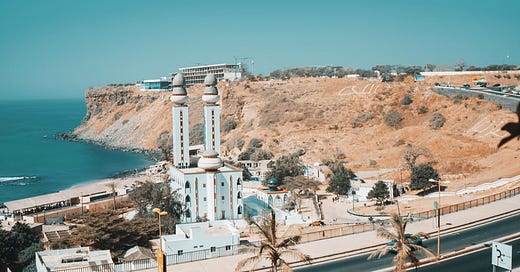Emerging Markets Daily - July 18
Senegal Plans Covid Vaccine Plant, Lebanon's "Financial Wizard" Faces Questions, Niger and Covid-19, China's Digital Yuan, The Naming of African Currencies
The Top 5 Emerging Markets Stories from Global Media - July 18 (Weekend Features Edition)
Senegal Plans ‘Africa’s First’ Covid-19 Vaccine Manufacturing Plant
African Business
'“The Senegalese government is building the first vaccine manufacturing hub in Africa with the capacity and equipment to produce Covid-19 and other vaccines.”
“Backed by global partners, the facility will be managed by the Pasteur Institute in Dakar, the only facility authorised by the WHO (World Health Organisation) to produce vaccines on the continent.”
“The scale of expertise, technology, equipment and funding required to build a vaccine manufacturing plant was previously lacking on the continent, and required large-scale global investment, the CEO of South Africa’s Biovac Institute, which acts as a fill and finish site for imported vaccines, says.” Shoshana Kedem reports
As Lebanon Collapses, the Man With an Iron Grip on Its Finances Faces Questions
The New York Times
“For decades, Riad Salameh, Lebanon’s central bank chief, was lauded at home and abroad as a financial wizard who kept the economy running and the currency stable despite wars, assassinations and frequent political turmoil.”
“Not anymore.”
“This country at the crossroads of the Middle East is suffering from a collapse of historic proportions: Its banks are largely insolvent, unemployment is soaring, its currency has crashed and many Lebanese blame Mr. Salameh for shortages that have left them struggling to afford food, scrambling to find medication and waiting in long lines to fuel up their cars.”
“Now, Mr. Salameh is being accused of a perhaps more unforgivable sin: enriching himself and his inner circle through years of corruption. Paris anticorruption judges opened an investigation this month into criminal allegations that Mr. Salameh, one of the world’s longest-serving central bank chiefs, fraudulently amassed an outsize fortune in Europe by abusing his power. The judicial investigation follows a preliminary inquiry by the French National Financial Prosecutor’s Office.” Ben Hubbard and Liz Alderman report
Niger Is the Land That Covid-19 Forgot
The Wall Street Journal
“This desert capital’s main coronavirus ward has been empty for months and hastily erected isolation facilities are gathering dust. Masks are almost unheard of in the streets and many days go by without a single person testing positive for Covid-19. There is so little demand for vaccines that the government has sent thousands of doses abroad.”
“Welcome to Niger, the land that coronavirus somehow forgot.”
“…But while Niger is struggling with a host of economic and security challenges, it is among a small group of nations on the southern edge of the Sahara that so far has mostly escaped the coronavirus scourge. The reasons—which appear to include a hot and dry climate, sparsely populated and poorly connected settlements and the world’s youngest population—have made Niger a crucial case study for virologists studying the evolution of Covid-19, experts say.” Benoit Faucon reports
China's Digital Yuan Pilot Tally Reaches $5.3bn in Six Months
Nikkei Asia
“China's digital yuan trials racked up 34.5 billion yuan ($5.34 billion) in transactions by the end of June, according to a white paper released Friday by the People's Bank of China.”
“The currency has been used in 70.75 million payments so far across more than 1.32 million "scenarios" -- not only in retail settings like stores and restaurants, but also for public transportation, utility bills and government services. The central bank said it has ‘no preset timetable’ for a full launch.”
“The test shows the rapid strides Beijing has made toward a central bank digital currency, an idea that is seeing increasing interest elsewhere in the world, including in the U.S. China has recently cracked down on other digital currencies, with the PBOC warning that asset-linked ‘stablecoins’ pose risks to global financial systems.” Iori Kawate reports
Where do African Currencies get their Names From?
The Africa Report
“The continent has some 40 currencies, and their names bear witness to a multi-century history of Greco-Roman and Arab-Muslim influences, colonial legacies and indigenous traditions.”
“The dinar – which is used today in Algeria, Libya, Sudan and Tunisia – comes from the Latin word denarius, which means ‘containing 10’. The denarius was originally used as currency during the Roman Republic era, and the term was later exported to many parts of the world. It has been translated into Greek, Spanish (dinero means ‘money’) and Arabic.”
“…Other currencies have names of Arab-Muslim origin. One such example is Mozambique’s currency, the metical. In circulation since 1980, its name is derived from the Arabic unit of measure, mithqal, which is a unit of mass equal to 4.25g.”
“…Several currencies have indigenous origins. The Eritrean currency, nakfa, has a highly symbolic significance. Nakfa is the name of a town in the northern part of the country where the Eritrean People’s Liberation Front celebrated its first significant victory against the Ethiopian government during the war of independence (1961-1991).” Anaëlle Salamon reports



